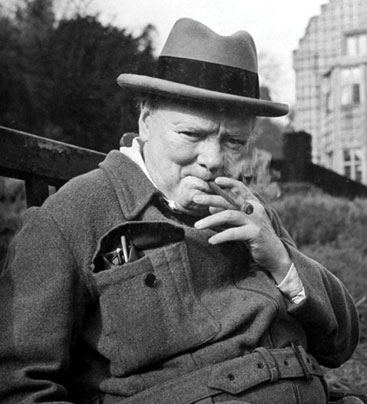CHURCHILL BACK IN BUSINESS, WEEK 7
Virginia Cowles, one of the many great female journalists of World War II, recounts encountering Winston Churchill at the French Embassy in 1950 and informing him that she was planning on writing his biography. “‘There’s nothing much in that field left unploughed,’ he growled good-naturedly.”
Little could he know.
We turn next to Cowles’ WINSTON CHURCHILL: THE ERA AND THE MAN, as we revisit the veritable handful of Churchill memoir/biographies written by women.
 It is extraordinary how difficult it is for many historians (and anti-historians) today to grapple with and comprehend retrospectively Winston Churchill’s complex character, when those who actually knew him seem to have so easily appreciated him in all of his contradictory glory. This is again driven home by Virginia Cowles’ today-overlooked book, published in 1953. “I first met Mr. Churchill in the beginning of 1938,” Cowles writes, “when his political career was at one of its lowest ebbs…
It is extraordinary how difficult it is for many historians (and anti-historians) today to grapple with and comprehend retrospectively Winston Churchill’s complex character, when those who actually knew him seem to have so easily appreciated him in all of his contradictory glory. This is again driven home by Virginia Cowles’ today-overlooked book, published in 1953. “I first met Mr. Churchill in the beginning of 1938,” Cowles writes, “when his political career was at one of its lowest ebbs…
“But despite his exclusion from power, he was still the most colourful and controversial figure in English political life. I had sat in the gallery of the House of Commons and watched the Chamber crowd to hear him speak… What he had to say was not of the past; when he leaned forward to warn his colleague of the dangers of Nazi Germany he became the incarnation of a pugnacious and perennial John Bull… When you went into the tea-room half an hour later you heard people chattering about what he had said with an alarming light-heartedness.
“Churchill spent most of his time at his country house, Chartwell in Kent, and one Sunday his son took me there for lunch…Small talk does not interest him; it is a question of silence or a monologue, and nothing in between. On this day, however, he expressed his fear that England would not only refuse to show her hand until it was too late to avoid war, but too late to win… After lunch I was taken upstairs to see his large, high-ceilinged, oak-beamed study. He showed me several stacks of manuscript of the history of the English-speaking peoples which he was then writing. ‘I doubt if I shall finish it before the war comes,’ he said morosely, ‘and if I do, the part the English-speaking people will play will be so decisive I will have to add several more volumes.’ He paused. ‘And if it is not decisive no more histories will be written for many years.'”
Born in Brattleboro, Vermont, Cowles had moved quickly from writing for the fashion pages to covering the Spanish Civil War, where she distinguished herself among her fellow journalists, including Ernest Hemingway and his future wife Martha Gellhorn, by determinedly writing about the conflict without bias for either side. Her attendance at a Nuremberg Rally helped convince her that America must enter the war, writing of Hitler as he left the stage: “His small figure suddenly became drab and unimpressive. You had to pinch yourself to realize that this was the man on whom the eyes of the world were riveted; that he alone held the lightning in his hand.”
Cowles chased the war across Europe, before basing herself in London after the fall of France. She witnessed the first night of the Blitz and the subsequent Battle of Britain firsthand. In 1942, after FDR replaced Joseph Kennedy, his Appeasement-centric Ambassador, with John Winant, Cowles briefly set her journalistic career aside to work for Winant, who became a splendid Churchillian advocate as America’s Ambassador to the United Kingdom for most of the war’s duration (while also embarking on an ill-fated affair with Churchill’s daughter Sarah).
Toward the end of WINSTON CHURCHILL: THE ERA AND THE MAN, Cowles describes watching Churchill “address an enormous gathering at Walthamstow Stadium on the outskirts of London” two days before the 1945 General Election that would drive him from office. She was “amazed at the amount of opposition and heckling he received… When he had finished, his daughter Sarah invited me to a private room to have a beer and sandwiches with them… When Churchill saw me he exclaimed: ‘What a bad omen! For the first time I have my doubt about this election. You only appear when the established regime is crashing to the ground!'”
Despite ever more irrational opposition heckling, we continue to wish you good health in the face of all that threatens to send our safety and our sanity crashing to the ground.


